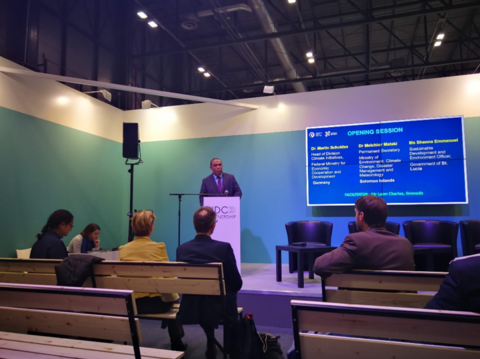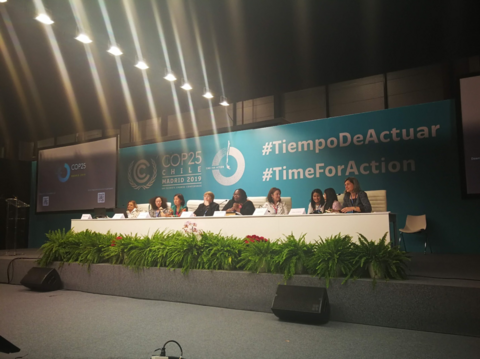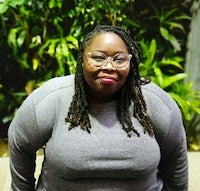If not us, who? If not now, when?
"If not us, who? If not now, when?" This quote, from the Commonwealth Secretary-General Hon. Patricia Scotland, summarises the current expectations at COP25.
In the past two days, I have attended several sessions aimed at translating the results of research and negotiations into action on the ground. Country ministers and civil society leaders are sharing their experiences of working alongside local communities and scientists to help advance resiliency and adaptive capacity for the islands and costal communities.
These sessions have been extremely informative, but for me, there were two events that have been the highlights of my first couple of days at COP25.
The first event was the joint session with Pacific and Caribbean Small Islands Developing States. This session focused on how these States have come together by first, recognising that the challenges that they are facing are similar, second finding value in working together and sharing their experiences, both the wins and losses, and third looking “at mitigation within the context of adaptation” instead of separately. I think, this collaboration is timely especially as the conversations around climate change are shifting toward climate emergency, rather than climate change.
The second event was an all-women panel discussion, chaired by the ECLAC sub-regional headquarters for the Caribbean, on empowering local communities in climate action and ecosystem conservation. The discussion focused on the human rights aspects of climate change and environmental degradation.
The main takeaways from these two events are:
- In order to promote effective climate action all stakeholders must be meaningfully involved in climate discussion and overall governance; and
- This can only be done through an inclusive, responsive and participatory decisionmaking process.
Discussions during the the side events at COP25 are focused on putting people at the heart of the fight against this climate emergency. I think it will be interesting to see how these discussions translate in the outcomes of the negotiations.


Later, I had the opportunity to assist to the Development and Climate Days (or D&C Days), this “unconference” event geared at linking the climate discussions taking place in-between the two weeks of COP with development and climate action taking place on the ground. The goal was to brainstorm solutions to the climate-related “wicked problems” of this world, such as disaster resilience, nature-based solutions and gender-responsive financing. Concrete and practical possible solutions emerged from the experience of various practitioners, researchers, policy makers and grassroots organisations representative working on the ground. I must note though that islands and ocean issues were completely absent of these discussions. Regardless, the D&C practitioners have a clear message: we must act NOW.
Following the D&C days, I attended the second week of COP. COP25 was the last COP before the Paris Agreement comes in force in 2020, and it was off to a rough start. It was supposed to be hosted by Brazil, but the newly-elected and climate denier President Bolsonaro refused to do so. The US, with President Donald Trump officially started the process to pull out of the Paris Agreement. Finally, social movements in Chile, the country who stepped in to preside the event, erupted just weeks before the start of the negotiations. Luckily Spain offered to host but, in the process, many from civil society organisations couldn't afford the change and were not able to participate.
Nevertheless, between the different side events and informative discussions with country delegates, solutions and “how-to” were being shared. With thousands of representatives from the 197 signatories of the UNFCCC, civil societies and indigenous peoples highlighting and sharing their respective experience in addressing some of those “wicked problems” they are facing, the COP25 was bound to be successful. I was particularly interested in following the discussions related to the Warsaw International Mechanism for Loss and Damage (WIM) which aim to address loss and damage associated with impacts of climate-related hazards, such as extreme weather events and sea-level rise; and to the Gender Action Plan. This COP was the longest one so far; it ended in the afternoon of Sunday December 15, 2019, two days later than originally planned.
During the event, things didn't go smoothly. Protests were organised inside and outside; more that 300 indigenous peoples, people of color and youths were (quite violently by some accounts) escorted out of the premises as they protested the negotiations process – delegates spending sometime 20min debating on trivialities such as misplaced comas – instead of focusing on finding ways to solve the current climate emergency, as it is now labelled in most discussion circles. And in fact, the outcomes do not reflect the latest scientific information available nor the urgency faced by some nations.
Before participating at COP, I had a somewhat idealised and naïve vision of the negotiations. For instance, it was really surprising that fossil fuel was never mentioned before. It would be logical to think that, with non-renewable fossil fuel being at the core of climate change, this would be the first topic that would be tackled by the discussions. It appears that unlike the World Health Organisation, which has prohibited the tobacco industry to take part in the COP discussions, the UNFCCC has no mechanism in place regarding the involvement of fossil fuel lobby within the process. The fact that Spanish energy giants Endesa and Iberdrola sponsored the meeting, responsible for the majority of Spain’s GHG emissions, illustrate the irony at play. This raises the questions: are we complicit in the final outcome of these failed negotiations by just participating in the event?
Having met and discussed with other observer representatives and some members of the African Group of Negotiators and the SIDS Group, here is my own two takeaway messages of the event:
- Money is the main divisive factor. This was highlighted on two occasions: first, countries failed to agree to on the rules for carbon markets – under the article 6 of the Paris Agreement – which signal the disconnect current extremely limited progress and global goals an ambition. Another similar example is the WIM, with countries like the US or Australia blocking any call for additional funding to compensate for climate impacts that SIDS and LDCs for instance, are facing. Allowing funding for the WIM would equal to an admission, from the big polluters, that their (in)action does have an effect on the more at-risk countries and would be an important step toward climate justice. The talks failed to reach consensus for these two points. It seemed that the call for action of local and indigenous communities fell in deaf ears.
- There will be no lasting, transformational change without the consideration of human rights, inequalities and power imbalances: one of the few positive outcomes of this COP is the adoption of a new comprehensive 5-year Gender Action Plan intended to “support the implementation of gender-related decisions and mandates under the UNFCCC process” (UNFCCC decision 21/CP.22, paragraph 27). This is an important step forward for human rights in general and indigenous peoples’ rights specifically.
Last but not least, I am extremely grateful of having been given the opportunity to participate at the conference and to meet the amazing people working day and night to bring forward the needs and hopes of the local communities they represent. There is no doubt that what I have learned during the conference will have an important influence on the direction of my research. However, I find myself asking: does the current negotiation system work? To be honest, I am not optimistic regarding any significant changes on climate change policies and debates happening at national and international levels. The aforementioned questions from Hon. Patricia Scotland were on the lips of most participants at the end of the conference. However, I believe that real change happens on the ground and that it is our duty, as future researchers and leaders to support and empower the people who are truly working for transformation.
References
Abreu C. and Henn J. (December 16 2019). Finally saying the F-words at UN climate talks. Climate Home News. Retrieved from https://www.climatechangenews.com/2019/12/16/finally-saying-f-words-un-climate-talks/
Evans S. and Gabbatiss J. (December 15 2019). COP25: Key outcomes agreed at the UN climate talks in Madrid. Carbon Brief. Retrieved from https://www.carbonbrief.org/cop25-key-outcomes-agreed-at-the-un-climate-talks-in-madrid

Lowine Hill is a PhD student in the School of Environment, Resources and Sustainability (SERS). She attended COP25 United Nations Climate Change Conference in Madrid, Spain during fall 2019. This is her reflection from participating as a student delegate.